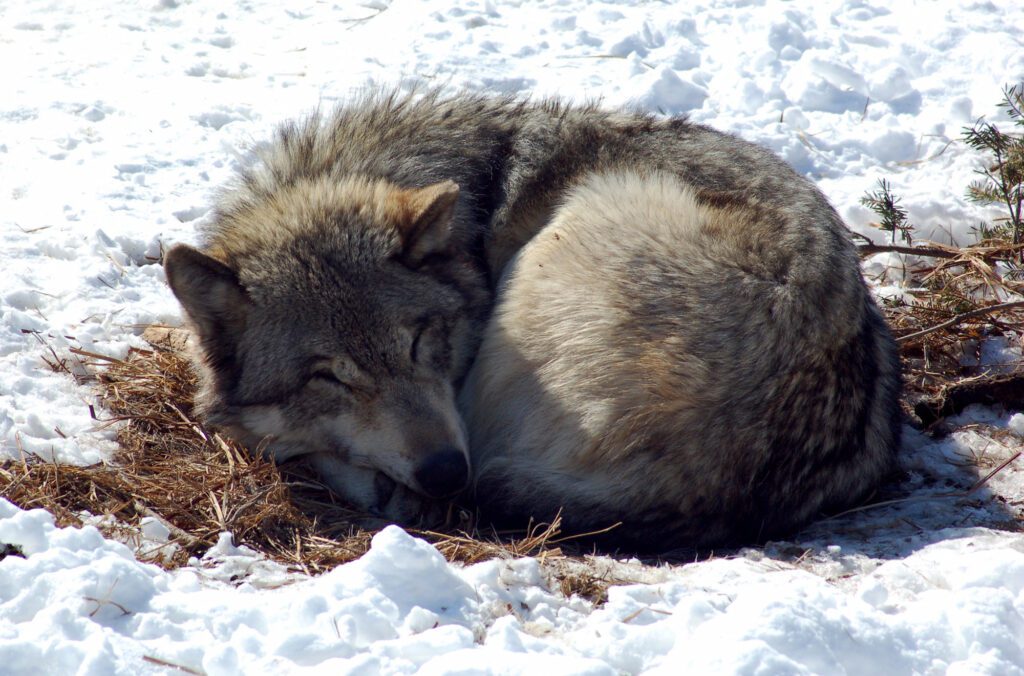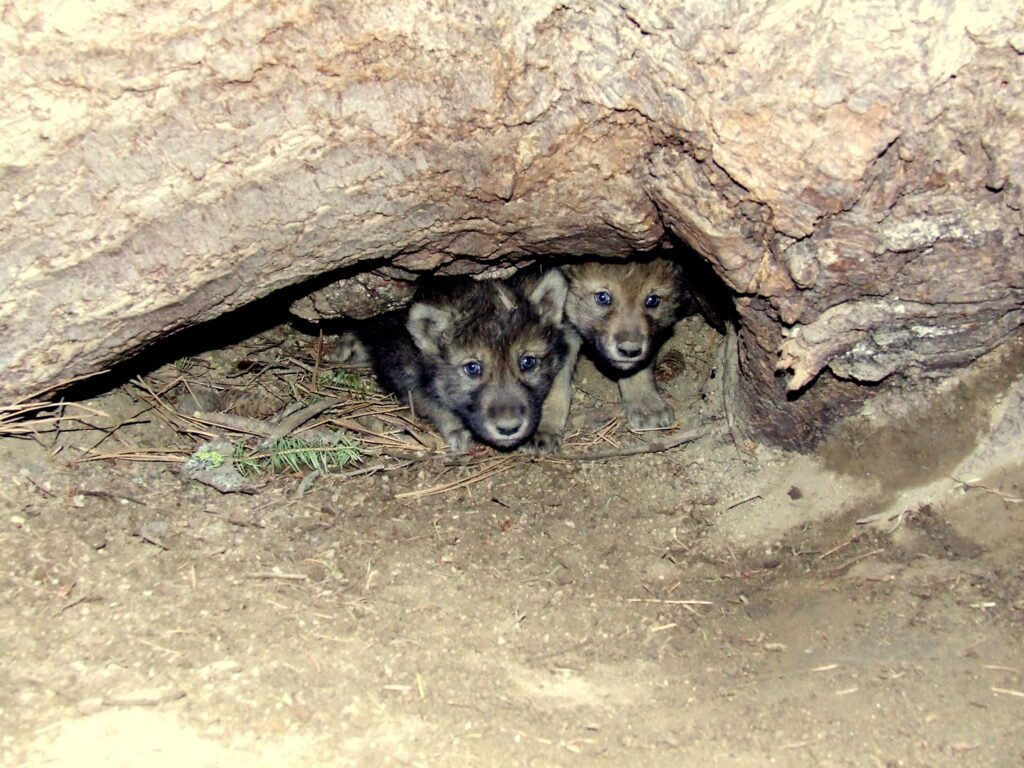


The U.S. Fish & Wildlife Service has given short shrift to a White House directive to use science in reviewing Trump’s decision to strip endangered species protections from the gray wolf.
By Reynard Loki, Independent Media Institute
8 min read
In one of the Trump administration’s final insults to science and the natural world, the endangered gray wolf in all lower 48 states was taken off the Endangered Species list on January 4, going against experts who say the species has not yet recovered and still requires federal protection.
Thankfully, on his first day in the White House, President Joe Biden ordered a broad review of his predecessor’s destructive anti-wildlife policies, including Trump’s decision to take Endangered Species Act (ESA) protections away from gray wolves in the lower 48 states—protections they have had since 1973, which have helped them return to parts of their former range. But just one week after Biden’s order, on January 28, the U.S. Fish & Wildlife Service (USFWS) asserted in a brief, three-paragraph letter to conservation groups that the Trump administration’s decision to delist the gray wolf was valid.
“There is no way the Fish and Wildlife Service followed President Biden’s directive and completed its review in just five business days,” said Brett Hartl, government affairs director at the Center for Biological Diversity (CBD). “It’s baffling that they went rogue by not even waiting till there was a new secretary of Interior to assess what happened under Trump. This is a slap in the face to the American public, who want scientific integrity restored to the government and to ensure that wolves are protected till they’re recovered across this country.”
According to WildEarth Guardians, a nonprofit that launched a public petition urging the Biden administration to put the gray wolf back on the ESA list, the most recent data from the USFWS and its state partners says that there are only an estimated 108 wolves in Washington, 158 in Oregon, and just 15 in California. The group also points out that while “Nevada, Utah, and Colorado have had a few wolf sightings over the past three years … wolves remain functionally extinct in these states,” adding that they “remain absent across vast swaths of their historical habitat in the West, including in Colorado and the southern Rockies.” The group joined a coalition of conservation and environment groups in filing a lawsuit challenging the USFWS decision.
“We have seen what happens when ‘management’ of wolves is returned to hostile state wildlife agencies disinterested in maintaining robust, stable, and genetically diverse wolf populations,” said Lindsay Larris, wildlife program director at WildEarth Guardians. “Idaho, which allows an individual to kill up to 30 wolves annually, saw the slaughter of nearly 600 wolves and wolf pups in a recent 12-month period. Now other states are gearing up to allow wolf hunting and trapping this fall. Returning this type of unscientific and barbaric ‘management’ to states at this early juncture would spell disaster for true gray wolf recovery, plain and simple.”

The Natural Resources Defense Council (NRDC), a nonprofit, filed a separate lawsuit against the USFWS, saying that the agency’s removal of the gray wolf from the ESA list was “unlawful,” and urged the court to throw out the agency’s decision and to order the reinstatement of federal protections. “We urged the last Administration to maintain federal protection for wolves and to implement a national wolf recovery plan,” said Sylvia Fallon, wildlife conservation project director at NRDC. “Instead, they removed protections that are critical to the future of the species at a time when they are still missing from much of their original habitat, and as the planet faces a biodiversity crisis that threatens the fate of humanity.” In addition, the group pointed out that the government has “failed to complete a national recovery plan as required under the Endangered Species Act.”
That biodiversity crisis was detailed last year in a United Nations report that found that around 1 million animal and plant species are currently at risk of becoming extinct, mainly from relentless human activity including climate change and habitat destruction. Many of these species are threatened with extinction “within decades, more than ever before in human history.”
“Ecosystems, species, wild populations, local varieties and breeds of domesticated plants and animals are shrinking, deteriorating or vanishing. The essential, interconnected web of life on Earth is getting smaller and increasingly frayed,” said report co-chair Prof. Josef Settele of the Helmholtz-Centre for Environmental Research in Halle, Germany. “This loss is a direct result of human activity and constitutes a direct threat to human well-being in all regions of the world.”
The gray wolf delisting is a gift to the meat industry. Though wolves primarily hunt wild deer and elk, they are also opportunistic and will occasionally prey on livestock. It is this behavior that has made wolves a pariah for ranchers, who are now able to kill them now that they no longer have protection under the Endangered Species Act. However, the best way to prevent wolves from preying on livestock isn’t to kill them, but to use proven and effective non-lethal management tools like turbofladry, a basic kind of electric fencing, or employing “range riders” to patrol cattle grazing lands on horseback, or simply using guard dogs. The bottom line is that there are humane ways to help wolves and livestock coexist in the same area.
In addition to threatening the recovery of gray wolves, Trump’s move is also bad for the environment at large, and even human health. “The delisting of gray wolves is a direct attack on ecosystems across the country where the apex predator can keep wildlife populations balanced and healthy,” said Dr. Fallon, in an email. “And healthy ecosystems aren’t just essential for wildlife—they also mean cleaner air, cleaner water and healthier people. The fate of humanity is intertwined with the fate of species and healthy ecosystems.”
“President Biden has made clear that listening to the science will be the hallmark of his administration. It’s sad the Fish and Wildlife Service didn’t get the memo,” said Hartl of CBD. “We won’t be able to take on the extinction crisis or the climate crisis if federal agencies like the Fish and Wildlife Service feel free to routinely ignore science whenever it suits them.”
Urge the Biden administration to restore Endangered Species Act protections for gray wolves.
Cause for concern…

“Crops currently occupy about 11% of the world’s land surface, with active grazing taking place over an additional 30%,” write Peter H. Raven and David L. Wagner, in a new study connecting the spread of agriculture during the past half century to “[m]ajor declines in insect biomass and diversity.”
- Agricultural intensification and climate change are rapidly decreasing insect biodiversity (Peter H. Raven and David L. Wagner, Proceedings of the National Academy of Sciences)
- The human victims of factory farming (Lindsay Patton, One Green Planet)
- Sea levels are rising faster than most pessimistic forecasts (Jonathan Tirone, Bloomberg Green)
- Global heating-driven ice melt could result in blooms of potentially toxic plankton algae in the Arctic. (Oceanographic)
- U.S. cities are vastly undercounting emissions (John Schwartz, The New York Times)
Round of applause…

“The Biden-Harris transition team identified COVID-19, economic recovery, racial equity and climate change as its top priorities. Rivers are the through-line linking all of them,” writes EFL contributor Katy Neusteter on Truthout. “The fact is, healthy rivers can no longer be separated into the ‘nice-to-have’ column of environmental progress. Rivers and streams provide more than 60 percent of our drinking water—and a clear path toward public health, a strong economy, a more just society and greater resilience to the impacts of the climate crisis.”
- Restoring our water systems should be top priority for Biden administration (Katy Neusteter, Earth | Food | Life on Truthout)
- Yellen signals action on climate change a top treasury priority (Sarah Ewall-Wice, CBS News)
- Justice department tosses Trump-era environmental directives (Ellen M. Gilmer, Bloomberg Environment)
- Judge orders U.S. officials to weigh coal mine’s climate costs (Matthew Brown, Associated Press)
- Russian court orders mining giant to pay $1.96 billion for Arctic spill (Celine Castronuovo, The Hill)
Parting thought…

“Thousands of people who say they ‘love’ animals sit down once or twice a day to enjoy the flesh of creatures who have been utterly deprived of everything that could make their lives worth living and who endured the awful suffering and the terror of the abattoirs—and the journey to get there—before finally leaving their miserable world, only too often after a painful death.” —Jane Goodall
Reynard Loki is a writing fellow at the Independent Media Institute, where he serves as the editor and chief correspondent for Earth | Food | Life. Reynard previously served as the environment, food and animal rights editor at AlterNet and as a reporter for Justmeans/3BL Media covering sustainability and corporate social responsibility. He was named one of FilterBuy’s Top 50 Health & Environmental Journalists to Follow in 2016. His work has been published by Yes! Magazine, Salon, Truthout, BillMoyers.com, EcoWatch and Truthdig, among others.
Earth | Food | Life (EFL) explores the critical and often interconnected issues facing the climate/environment, food/agriculture and nature/animal rights, and champions action; specifically, how responsible citizens, voters and consumers can help put society on an ethical path of sustainability that respects the rights of all species who call this planet home. EFL emphasizes the idea that everything is connected, so every decision matters.
Click here to support the work of EFL and the Independent Media Institute.
Questions, comments, suggestions, submissions? Contact EFL editor Reynard Loki at [email protected]. Follow EFL on Twitter @EarthFoodLife.